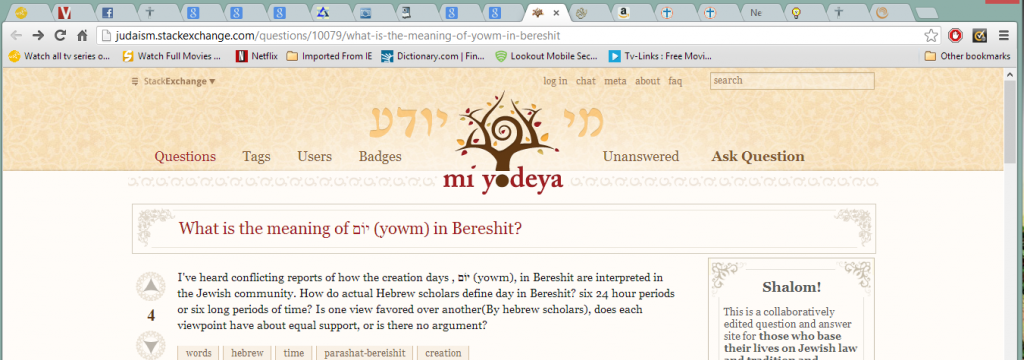chessman
Member
- Feb 5, 2013
- 4,653
- 339
- Thread starter
- #121
... I'd like to ask that you allow me (and others) to interject their thoughts and bring in the thoughts of experts on the subject. I trust this will not exceed your patience with dealing with the thoughts and opinions of others. ...I would like to ask you to contrast what you have said about the relative age of the mountains being "ancient" and what the Lord has said about His creative acts: Isa 48:3, "I foretold the former things long ago, my mouth announced them and I made them known; then suddenly I acted, and they came to pass," would seem an excellent target for further research, yes? This is the link from the tool you provided: Isa 48:3.
It's not for me to say what others are allowed to post or not. I'd just hope that people are quoting Scripture accurately and that they are relevant to what the Bible has to say about the age of the Earth and discussing them and yes even giving their opinions/analysis on them.
It's true that I'm not the most patient person in the world, I mean the USA, I mean Florida, I mean my house. I may be the most impatient person ever. But I do try to get better.
In my opinion, and with just a quick glance at what commentators have to say about this passage, I don’t see how it’s relevant. I could be wrong or missing your point or something. Is 48 in general (context) is about God chastising if you will, Israel for their stubbornness and unbelief in God’s word. Are you saying Is 48:3 is discussing what God had to say about Creation?
Maybe you are understanding “in the beginning†as reference to creation. I’m assuming here so correct me if I’m wrong. But if that’s true, I believe it’s an incorrect assumption. In fact the context is pretty clear that what God means here by “in the beginning†was in the beginning of Israel as a chosen people and/or of His prophesizing things that would happen to them (Israel) and that in fact had come true to them already in thier history. Yet they still refused to obey, etc. etc. I don't think "in the beginning" is a reference to creation in the frist place.
The Amplified notes (for just one example) on this passage indicate that this is not a reference to the beginning for the Earth or Creation.
Is 48 (AMP) 1Hear this, O house of Jacob, who are called by the name of Israel and who come forth from the seed of Judah, you who swear allegiance by the name of the Lord and make mention of the God of Israel—but not in truth and sincerity, nor in righteousness (rightness and moral and spiritual rectitude in every area and relation)—2 For they call themselves [citizens] of the holy city and depend on the God of Israel—the Lord of hosts is His name.</SPAN>3 I have declared from the beginning the former things [which happened in times past to Israel]; they went forth from My mouth and I made them known; then suddenly I did them, and they came to pass [says the Lord].</SPAN>4 Because I knew that you were obstinate, and your neck was an iron sinew and your brow was brass,</SPAN>5 Therefore I have declared things to come to you from of old; before they came to pass I announced them to you, so that you could not say, My idol has done them, and my graven image and my molten image have commanded them.</SPAN>6 You have heard [these things foretold], now you see this fulfillment. And will you not bear witness to it? I show you specified new things from this time forth, even hidden things [kept in reserve] which you have not known.</SPAN></SPAN>
So when God says here “from of old†He “declared from the beginningâ€, etc. He means His prophecies prior to Isaiah's time. So let’s say Isaiah wrote this during Uzziah’s reign (ironically with regard to the genealogy discussions) around 740 B.C. It would then be all the prophecies already given to Isarel (people called by His name) that had come true by then that is being discussed , not creation. Anyway, there’s my take on the passage. Unless I’m missing something, I don’t see how it’s relevant to our discussion.
Maybe you mean He in fact calls the prophecies "of old" when they were what, maybe just a few hundred years "old". I don't know. Was that your point?





